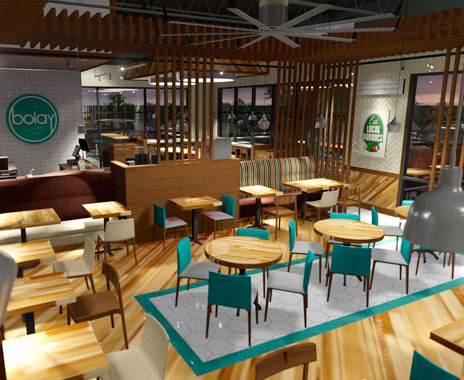Perhaps no segment of the restaurant industry has taken a harder hit from the relentless growth of the fast-casual sector than casual dining.
In a culture of increasingly budget- and time-conscious consumers, the overwhelming trend has been for folks who formerly frequented casual-dining restaurants to elect to save time—and money—by trading slightly down to fast casual.
Don’t think the casual-dining world hasn’t noticed. Many casual players have opted to at least stick their toes in the fast-casual waters. Among the early adapters were P.F. Chang’s with its Pei Wei concept and Wolfgang Puck with his Wolfgang Puck Express offering. Plenty of other familiar casual-dining chains have tried, too, including Bennigan’s with Bennigan’s On The Fly and Beef O’Brady’s with Beef’s Express.
Now, in 2016, two more familiar casual-dining veterans are giving fast casual a try. The family behind Outback Steakhouse is opening the first unit of its new Bolay brand in Wellington, Florida. Meanwhile, the folks behind 50 Eggs and the wildly successful Yardbird Southern Table & Bar are opening a fast-casual version of the latter under the name Spring Chicken.
“For casual-dining companies to enter the fast-casual segment is a natural extension,” says Janet Lowder, president of the consulting firm Restaurant Management Services. “Millennials have continued to contribute in changing the restaurant game.”
So has the shaky economy. In economically challenging times in particular, the move by some restaurateurs from casual to fast casual makes perfect sense. For one thing, the cost to finance a fast-casual restaurant can be a fraction of opening a casual-dining or fine-dining establishment. At the same time, fast-casual restaurants typically cost much less to operate on a day-to-day basis.
The move into fast casual was a no-brainer for John Kunkel, CEO and founder of 50 Eggs.
“It’s a concept that’s potentially recession-proof,” he says. In casual dining, he says, it’s a big deal if you see the same customer twice in the same week. But in the fast-casual world, it’s not entirely unusual to see the same customer twice in the same day.
That’s why, following the success of his two upscale Yardbird Southern Table & Bar locations in Miami Beach and Las Vegas, Kunkel decided to go in a new direction with Spring Chicken, which will be based in Southern Florida and will have very similar food to Yardbird, but offered in a fast-casual atmosphere at a much lower price.
The first Spring Chicken is scheduled to open in late January near the University of Miami. A second will open shortly after in South Beach, followed by a third in Ft. Lauderdale. Later this spring, a fourth is scheduled to open at Miami International Airport.
In the world of fast-casual dining, there’s already a plethora of burger and Mexican chains, but, beyond Chick-fil-A, not a lot of chicken contenders, Kunkel says. With Spring Chicken, he hopes to fill that void. The menu is Southern-inspired, the atmosphere is laid back, and the prices aren’t budget busters.
For example, the signature Southern Fried Chicken—marinated more than one day and fried to order—fetches a cool $36 at Yardbird, but the same recipe for half a chicken goes for about $14 at Spring Chicken. The Yardbird chicken sandwich goes for $14, but customers can get chicken sandwiches with two sides for $4.99–$6.49 at Spring Chicken.
“The key is to create something scalable that appeals to the masses,” he says.
The cost to open a Yardbird versus a Spring Chicken “isn’t even in the same universe,” Kunkel says. While a Yardbird can cost $4–$8 million to open, a Spring Chicken might cost $550,000–$800,00 per store. “That’s a very different investment,” Kunkel says. “With Spring Chicken, I’m not putting all of my eggs in one basket.”
He dreams of expanding Spring Chicken well beyond Southern Florida, including up the East Coast and beyond. But Kunkel advises other restaurant owners to think hard before rushing into fast casual. “Just because you are successful in one doesn’t mean you’ll be successful in the other,” he says.
That’s not stopping the cofounder of Outback from testing a new fast-casual chain.
Tim Gannon, who cofounded Outback Steakhouse, is teaming up with his 32-year-old son, Chris, to open the first Bolay, a unique twist to the segment. Bolay is laser-focused on flavorful, nutrient-rich food, mostly served in bowls. The first one is scheduled to open in Wellington, near West Palm Beach, in January.
“We’re trying to appeal to the consumer with a shorter amount of time but who still wants a balanced meal,” says Chris Gannon, who is CEO of the new venture but prefers to go by the title “team player.”
Where the check average at an Outback is $19–$22 per customer, at Bolay, it’s nearly half that, at $10–$12, Gannon says. Guests at Bolay build bowl lunches from base items including Gluten-Free Cilanto Noodles, Peruvian Quinoa, and Marinated Kale & Currant Salad.
At about 2,500 square feet, a Bolay unit is about half the size of an Outback restaurant.
After developing in Southern Florida, the chain hopes to spread across the East Coast and eventually open stores nationally and internationally, Gannon says.
Could there ultimately be more Bolay locations than Outback, which now has more than 1,200 worldwide?
“It’s a possibility,” Gannon says. “I never say never.”











